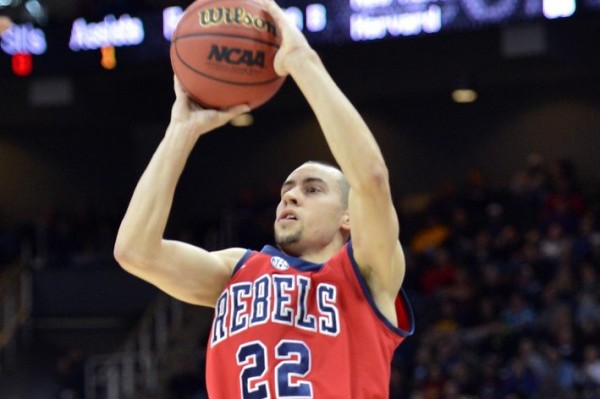SEC Advanced Metrics Superstars
Posted by Brian Joyce on October 30th, 2013The concept of advanced metrics certainly has its critics across the college basketball landscape. Basketball players, especially of the young and unpaid variety, are far from robots that perform exactly as their percentages suggest. We know this because Ohio State did not win the 2011 National Championship, Florida was not in the Final Four last year, and I am not filthy rich from winning gambling bets. It is clear that utilizing advanced statistics such as offensive ratings, offensive rebounding percentages and percentage of possessions must be balanced with what we see on the court, but advanced statistics can give us an in-depth look at a player’s potential.
To preview the SEC season ahead, we are going to look at players who excelled in advanced and tempo-free metrics last year in an attempt to predict who will be a standout this season. If we know a player scored 14 points per game, we need to know how many times he shot the ball to know how efficient he was. And just because we know a player scored only four points per game doesn’t mean that he was inefficient, but maybe he didn’t see many minutes or play a large role in the offense. Advanced metrics allow us to take our analysis one step further and hopefully serve to make more accurate predictions. Allow us to present our 2013-14 SEC advanced metrics superstar awards (refer to Ken Pomeroy’s explanations page for help with definitions).
SEC Breakout Players
We are looking for players who were largely role players last year but could become major contributors this season. We are specifically examining players with fewer than 60 percent of minutes played last season. And the nominees are…
- Michael Carrera, South Carolina – Carrera was just a freshman last season, but his advanced statistical profile was solid. He had a good offensive rating (102.8) despite being a high volume shooter (25.4% shots and 27.0% poss.). The really impressive part, though? He placed in the top 25 in the nation in both offensive (16.0%) and defensive (25.0%) rebounding percentages. At just 6’5”, Carrera finds a way to come up with the ball. Look for the Gamecock sophomore to become a centerpiece of Frank Martin’s second year in Columbia.
- Michael Frazier, Florida – A lot of points walked out the door in Gainesville, but Frazier remains. He saw limited action (43.7% minutes) and a limited role on offense (15.8% shots), but he had an offensive rating of 121.2 with incredible three point shooting (46.8%). Can he remain this efficient with an expanded role? His 63.3 percent effective field goal percentage gives us hope that he can.
- Jabari Brown, Missouri – Brown had a 113.4 offensive rating, a 51.6% effective field goal rate, and was part of a very crowded backcourt last season with the Tigers. The crowd has thinned quite a bit, so look for Brown to take a big step forward this year.
SEC Outstanding Rebounders
We aren’t just looking for outstanding defensive rebounders, but players who can rebound on both ends of the court. The 20/20 club (>20 OR% AND >20 DR%), representing a player who rebounds at or above 20 percent in both offensive and defensive rebounding (while keeping above a 40% minutes), is a rare feat in college basketball. Since 2004, only five players have achieved this distinction. Kentrell Gransberry did it in 2007, Kenneth Faried in 2008, DeJuan Blair in 2009, Brian Zoubek in 2010, and Alan Williams in 2011. No SEC player has made this rare club, though DeMarcus Cousins came awfully close in 2010 (19.6 OR% and 25.1 DR%). Could this be the year that someone from the SEC breaks through? 2013-14 has some good candidates:
- Jarnell Stokes, Tennessee – Stokes was a rebounding beast with Jeronne Maymon on the bench with an injury. It’s possible that because of Maymon’s presence, Stokes will grab fewer rebounds, but it’s also possible that he’s just so good that he continues to rebound at an amazing rate. Last year he was very close to 20 percent on the offensive end (17.3 OR%) and has been over that mark on defensive rebounding in both 2012 and 2013.
- Dorian Finney-Smith, Florida – Finney-Smith last played in 2012 for a bad Virginia Tech team, but he was an outstanding rebounder that season. Both sides of his rebounding game were solid (11.4 OR% and 17.4 DR%), so expect some improvements after he has been sidelined for a year. And with the number of shooters in Gainesville this season, what else will Finney-Smith do if he doesn’t go underneath the basket and grab some boards?
- Will Yeguete, Florida – If you’re looking for a player to join the 20/20 club, how about start with one who’s already done it? Yeguete made the club in 2011, albeit with an asterisk because he only played in 14.6 percent of the available minutes for the Gators, when he grabbed 20.2 percent of offensive rebounds and 23.0 percent of defensive rebounds. As he’s received additional minutes, his rebounding percentages have remained high, so why couldn’t he continue on an upward trajectory once he becomes fully healthy?
Honorable mention: Michael Carrera, South Carolina – We’ve already mentioned Carrera’s outstanding rebounding prowess, and it deserves another nod. As he becomes a more central part of Frank Martin’s offense, it is reasonable to assume that his rebounding percentages will suffer slightly as he focuses less on that aspect of his game.
SEC Outstanding Defenders
Last year, 31 players in the NCAA and two from the SEC played at least 40 percent of minutes available and achieved at least a 10 percent block percentage. The two from the SEC were Nerlens Noel and Reginald Buckner, and they turned out to be fairly decent defenders, so looking for players close to the 10 percent mark in block percentage seems like a good place to start.
- Assauhn Dixon-Tatum, Auburn – Dixon-Tatum played in just 34.3 percent of available minutes last year because of Rob Chubb’s presence down low, but despite that limited role he achieved a remarkable 12.2 block percentage. He may not be able to maintain that level of output, but with Chubb now out of the way, Dixon-Tatum will be accumulating a lot of blocked shots.
- Willie Cauley-Stein, Kentucky – It’s not a requirement to have double last names to make this list, but it doesn’t hurt when you fill in for an injured Nerlens Noel and maintain an 8.39 block percentage. Cauley-Stein is like a pogo stick in the middle and he is likely to be very close to 10 percent again this year.
- Anthony Hickey, LSU – No, Hickey doesn’t block shots, but he does steal the ball. A lot. Hickey was seventh in the country in steal percentage at 5.15 percent last season. He was even in the top 50 in the category during his freshman year. And he is probably going to continue to steal the ball this season. A lot.
SEC Ball Hogs
We’re not just rewarding players who are ball hogs, but rather players who are efficient ball hogs. We are looking for high usage guys with offensive ratings above 100. Seventy-one NCAA players achieved at least a 100 offensive rating while being involved in at least 28.0 percent of his team’s possessions last season, but BJ Young was the only player from the SEC to do so. A high usage, high efficiency profile is difficult to achieve, so these could be our dark horse guys for SEC Player of the Year or at least First Team All-SEC.
- Jarnell Stokes, Tennessee – We already talked about Stokes’ exemplary rebounding skills, but we haven’t discussed his offensive skills yet. He was a high usage guy last year (26.2% possessions), but still was able to maintain a nice 107.4 offensive rating. It is quite possible that he will be surrounded by a better and more efficient team this season, but as he works to expand his offensive repertoire, his advanced statistics could just continue to improve.
- Trevor Releford, Alabama – Releford had an extremely high 116.5 offensive rating, and he was involved in 23.2 percent of his team’s possessions last season. Releford is very efficient (54.4% eFG), doesn’t turn the ball over often (15.2% TO rate), and doesn’t have much offensive help in Tuscaloosa with the departure of Trevor Lacey. Releford will be the man for Alabama, and quite possibly for the SEC as well.
- Marshall Henderson, Ole Miss– It’s easy to observe Henderson shooting three after three and assume that he isn’t a very efficient player. But if you think that, you would be wrong. He’s a solid shooter (above 50.0% eFG), which is very impressive considering his starring role in the offense. He also takes the term high usage to a new level. He was involved in 27.9 percent of the Rebels’ possessions and he exceeded 30.0 percent in shots taken last year. He will be shooting over and over again in Oxford, and he’s likely to make a lot more of those than he misses.
There it is folks, the advanced statistical profiles to watch out for during this star-studded SEC season. Advanced metrics may not tell us everything, but it’s as good a measure as anything else when looking to preview key players in an upcoming year.















































This is a great article Brian.
Thanks! A KenPom subscription is a must for every college basketball season.